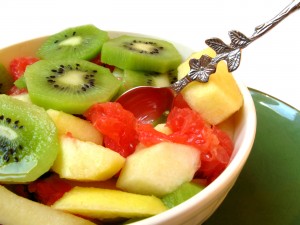
As someone who’s already made these kinds of changes in her life, I thought it might be a good idea for a series on dietary lifestyle changes – what they are, how to convert, and what they can (and cannot) do for you. They’re typically uncommon and because we rarely think about changing our lifestyles in this way, they’re an untapped mine for opportunities to eat healthier.
Firstly, let’s talk about dietary restrictions. When I say “dietary restrictions,” I’m not referring to diet in the “American” sense. When we say “diet” we often mean “temporary,” as in “the Grapefruit Diet” or “The Lemonade Diet.” (Thank you, Beyonce.) That’s not what I’m getting at. Dietary restrictions are common place for people with allergies – allergic to peanut butter? You’re going to restrict Peanut Butter Cookies from your diet. Allergic to shellfish? Crab will eternally be restricted from your daily diet. Dietary restrictions are basically a daily lifestyle that makes it clear to you what you will and will not be eating.
Now.. let’s talk about options. When it comes to eating lifestyles, you have plenty of options.
Vegan. [cue horror music]
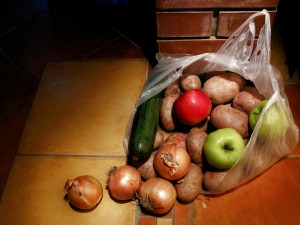
There’s an emotional commitment to veganism, I think. There’s a passion there that you’re going out of your way to go against society and the prevalence of animal by-products for a very real purpose. Animal by-products are everywhere, and it requires major effort and consciousness to not slip up.
The positives about this are not only the commitment to the environment, but the commitment to your health. If you are vegan and avoid processed foods, you’re on a pretty solid path for good health. It basically leaves you fruit, nuts, and vegetables. If done properly, you can ensure that you get all of the nutrients you need with minimal interference and involvement from the outside world OR animal products.
The negatives are the serious risk of malnutrition if you’re not careful. Most Americans are used to getting the whole of their calcium from dairy products. If you cut dairy without finding a suitable replacement, you will feel it. Most Americans get their protein from animal meat. If you don’t plan for that, you will feel it. If you get most of your food from processed foods, you have to think about nutrition. Seriously. It’s not healthy for you just because it says “healthy” on the box, and most food manufacturers know that new vegans are dying for good tasting food… healthy-ness be damned.
Raw Vegan [cue hippie music]
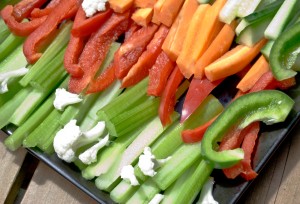
I think there are a ton of positives here – super inexpensive; no processed foods; with all the super low calorie counts for produce, you literally could eat all day and still not overeat; your body would get back to the way it should be, with only focusing on digesting things it’s been digesting for centuries. Not… high fructose corn syrup.
The negatives? The difficulty – no bagels in the meetings. No potato salad at the family reunion. No corn-fresh-off-the-grill. No ribs. No ice cream. You’re doing a wonderful thing for your body, but your mind’s memories of food will make the struggle long and hard. Then again, the harder the struggle, the better the reward? I don’t know too many unhealthy (not fat, unhealthy) raw vegans… and I know plenty of ’em.
Vegetarian
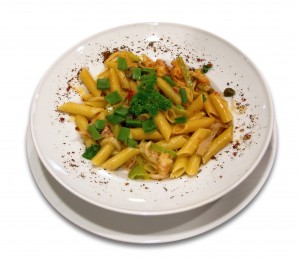
The positives here are that because you’re cutting back on a heavy-in-calorie food category, you can indulge more in your fruits and veggies without breaking the bank in calories and getting wholesome nutrition.
The negatives are simple. When I converted to vegetarianism a while back, I [foolishly] thought that just because I wasn’t eating meat that I’d lose weight regardless of what I ate… so I went in on the hot fries, the doritos, the grilled cheese sandwiches… why? I mean, it’s vegetarian! Well, (like many of the negatives above) ignoring proper nutrition will leave you running short. I developed a quick bout with hypoglycemia, but eventually got myself together by using the next option.
Flexitarian
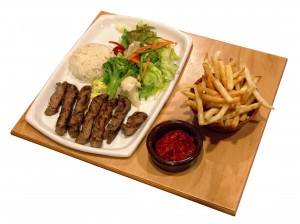
The pros here are that since you’re relying less on meat, you get much more creative with your dishes. You get to save a little money buying less meat, you get to indulge a little… you also don’t have to shut yourself off eternally from the things you enjoy. You just get to realistically cut back from them in an accepted fashion.
Are there cons to Flexitarianism? Seriously? Outside of the initial pain of sacrifice, I don’t think there is one. Lots of us are flexitarians and never even knew it. The joke is that flexitarians are vegetarians with commitment issues. I won’t tell you that you have to commit.. ’cause this is one instance where it might benefit you.
Pescetarian
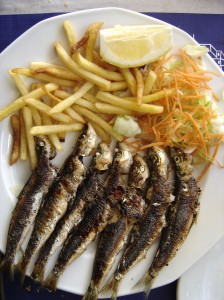
The pros are simple – since you’re taking in so much fish, you’ll definitely get in your omega-3s, which (while I rarely promote focusing on individual nutrients, I do like when we’re getting nutrients in their original form.. from nature) promotes a healthy heart. I think my folks in NoLa or the DC/MD/VA area might appreciate this.
The cons? Living anywhere else not rich in seafood and trying to live this lifestyle. A pint of crab meat was little over $11 for me here in Miami. Uh, I’m good.
Pollotarianism
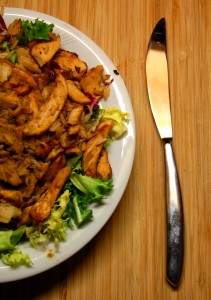
The positives – a simple solution for the question, “Well, where do you get your protein?” Limited restriction, but enough to make a difference and a major shift in your diet.
The negatives? Outside of the sacrifice? Outside of trying to figure out a different way to cook poultry every night? Meh.
Polpescetarian
This is simply a combination of the previous two. You’re basically cutting out red meat and pork.
You’ll notice that all of these options begin with – at their core – cutting out pork and red meat. Sometimes, if you can’t get the better quality of meats, it might be best to consider cutting it out. I could go into reasons why, but I’ll save that for another post. The bottom line is, if you’re doing a lot of fried pork, or burgers full of condiments and other things that might be calorie overkill, it might be a nice way to switch it up and maybe cut down your reliance on those items.
I’ve been all of these – yes, all of ’em – and couldn’t say that I am one in particular. At various points in my journey, I’ve been all of them. I haven’t had red meat or pork since 1999. I do go long periods of time without chicken. I eat very little dairy. I go extended periods of time eating like a raw vegan but because I still cook for my daughter, I’m tempted regularly to step outside of myself and chow down a bit.
I’d prefer to be a raw vegan. I know my dieting habits are pushing me in that direction, but I also know that’s giving up a LOT. So I’m not rushing it. After taking about six months to make the conversion, I eat chicken maybe once or twice a week, dairy maybe twice a week, and ground turkey maybe twice a month. I’m taking my time with it.
In closing, I do believe this is a decision best made after giving careful consideration to how you can execute it. As you can see, avoiding nutritional deficiency is a big issue and shouldn’t be taken lightly just to lose weight. It’s easy to get your protein and healthy fats outside of meats – peanut butter and basic nuts are a prime example – but if your daily routine can’t accommodate it, work to make sure that it does or find a more suitable option.
I’ll be writing more about this topic, so let me know – what questions do you have about these options? Do you live one of these lifestyles? If so, how has it benefitted you? Are you on the journey to change now, as well?


57 comments
I used to follow vegetarian, but now i ptactice Flexitarian lifestyle. I choose to make a veggie the main dish at meals. I usually only eat meat for dinner and not every night
I am not a vegetarian but I do not eat meat very often. I might eat meat twice a month, chicken, maybe once a week if I have to. Mostly I eat dishes that include vegetables, fruit, cheese, eggs, and fish (mostly wild). I agree with the comment above, I am a Flexitarian.
I am looking for a lifestyle change and I know when I eat more fruits and veggies I feel a whole lot better. So I might become a flexaterian. My main problem is maintaining once I reach my goals.
im a pescetarian and your right it can get expensive but i only eat fish a few meals a week so i guess im mostly vegetarian
I’m a very happy flexitarian. I make a point to make fruits veggies and whole grains the main point of my meals and use meat as a nice little “accessory” if you will. For the most part it works.
Happy Vegan here! It’s important to note that you can suffer from malnutrition no matter what type of diet you have. You must have balance. Also, when choosing a diet, people need not fret about where their protein is coming from. There’s plenty protein in a vegetarian/vegan diet. The best proteins come from legumes, oats, green veggies and rice!
for 21 days in Jan i had no meat, no cow milk(soy milk, allergic to almonds so unable to have almond milk) incorportated lots of morningstar products, cooked a few meals for the kids and they devoured it like vultures still. now that lent has begun there will be no meat cooked in my house, more fruits, veggies, maybe fish once a week if i feel like it. guess i can say i am a Flexitarian and love it..
Ain HD is right, the BEST source of protein is from legumes (beans) and green leafies! Same with Calcium–you absolutely don’t need dairy to get your calcium requirements. I’ve been a vegetarian for about 10 months now, but before I made the change, I read as much as I could about vegetarian diets and proper nutrition. The China Study really opened my eyes. And “Becoming Vegetarian” is a great resource. So far, I’ve lost about 80 pounds and I still have about 70 more to go. I was also 300+ and didn’t want to think about surgery, so I explored my alternatives and vegetarianism is what is working for me. Oh yeah, whenever you can, check out “Earthlings” on You Tube. I bet you’ll never go back to eating meat. Trust.
Thanks Erika, for this blog and for your gift of life to those among us who really need to save our own lives. You’re an inspiration!
Very happy flexitarian over here and loving it.
I’ve been this way for awhile, even before my adoption of clean eating.
And trust me, its hard to do in Atlanta cause I swear meat is a big part of every meal.
Another great job Erika, keep em’ coming!
I can only imagine! The South is GOOD for a BBQ joint on every corner, man!
Thanks. 🙂
As with anything, I think it depends on how you do it. I really appreciate your writing this because though I am not a vegetarian and have no plans to become one, I do eat only whole foods, mostly made at home with ingredient I recognize and without sugar–almost low carb but not quite what people usually think of. I eat vegetables a plenty. I just don’t eat breads, crackers, cakes, etc.
At any rate, I have friends who are vegetarians but don’t eat very much vegetables–mac and cheese, candy, rice and peas, potato– and talking about how healthy they are. So, this is good news from my view.
I should also say, I eat organic chicken and pork and grass fed beef and goat–an important distinction for a meataterian.
I have been going back and forth for years flirting with vegetarianism…but true to the joke, I do have commitment issues :o) So, I am a happy flexitarian as well. I have been officially “off meat” for the past two months, with the exception of seafood and I have indulged for holidays and special days when the smell of food from my grandmother’s kitchen could not be denied.
Overall, I have felt physically better by leaps and bounds. The change in my diet has drastically helped me address the fatigue issues I’ve been experiencing as a result of my hyperthyroidism (which has also been quite flexible over the past two years, dipping down into hypo a few times) No gallons of coffee necessary – I feel great!
There’s a lot of talk about the effects that digesting meat has on the energy one has to actually carry out basic function. I’ll have to quote one of my favorite books in the near future to talk about this – not as a reason to give up meat (though that would be alright), but to at least curb one’s intake of it, and raise the quality level – because the way they put it is much more effective than what I could do… but know that that line of thinking makes sense to me.
Great post! I liked how you explained everything. *claps* People definitely need to be clear on all the choices out there! But veganism can be a dangerous road.
I used to be a vegetarian(then whole food vegan), and unfortunately my iron deficiency anemia came back full force. I was taking supplements, combining my iron rich foods with vitamin c rich foods, avoiding foods/beverages that took away iron from my body, etc… Nothing worked! My skin was breaking out, my hair was brittle, I was irritable, etc… I was at a loss. I was getting sick and ironically, fat, from eating complex carbs in the vegan diet. And I didn’t have enough energy to work out properly and excuses came soon after. I even cut out all junk food and it still didn’t help!
With the support of my loved ones (and most importantly God) I left veganism for more of an omnivorous diet. Humans are naturally omnivores, so why not? I feel tons better! I try to eat at every meal (or at least one) a combo of meat and vegetables. I am lactose intolerant, so I go easy on dairy (lactaid is my friend for calcium!). Bringing back beef and eggs and combining them with leafy greens really helped a lot. I take an omega 3 supplement (flax oil, people in my house can’t have fish oil due to allergies) and a standard multi to help out, too.
So I’d want to advise people to be careful with veganism and listen to your body! I had to learn the hard way and I almost got myself seriously sick. Being an omnivore is the best thing that has happened in my life. Our ancestor hunted animals and supplemented that with foraged fruits and vegetables. That’s the way God made us and I’m glad to have listened to Him.
May God bless you with good health! <3
And I would like to add that the protein and iron from the animal sources and the omega 3 supplements helped with my energy- a lot! It gave me the energy to finally work out with cardio and strength training. I’ve never had this much energy since I was a kid!
I still eat veggies, fruits, and complex carbs. But I cut back a little on the carbs, because I notice I gain more weight when I start rely on them a bit more than I should. ^_^
Nice article….I fall into the flexitarian. It is quite a challenge today to feed oneself with healthy affordable nutrients. I try to shop farmer’s market during season. Last night I purchased a loaf of bread, when I opened it this morning, it should signs of spoilage. Supermarkets are not delivering the quality of foods we enjoyed a few decades ago. While hormones and antibiotics are banned in Europe, these chemicals are allowed in the U.S. I would like to see an article on shopping healthy foods on the market.
You were right, I guess without knowing it I have been a ‘Flexitarian’. I never liked red meat and pork that much or meat in generally however I had iron deficiency issues so I could not/ would not cut out meat entirely. I live in a coastal city so I love fish too and can find it at a relatively reasonable price. Anytime I eat lighter and more balanced, in general, I feel more focused with better stamina. I like to keep my food choices, not only clean, but simple as possible. I would like to see more recipes that taste great but only require the ingredients I already have in my kitchen, not over-priced yet creative and tasty ingredients and spices. Right now my favorite three seasonings are paprika, pepper and cumin (of course a moderation of salt too but that goes without speaking!). My top three raw vegetable favorites are bell peppers, onions (red & white) and celery (my middle son used to eat onions and tomatoes like apples! Yuck!). My top three fruits are bananas, apples and mangos. Tomato’s, cilantro and carrots I buy frequently as well and most all the veggies we eat raw with exception to frozen veggies. Frozen foods; I always buy the mixed baby veggies with peas, carrots, green beans and corn. I have a limited budget and I can get these rather cheap and my kids love em’! I regularly mix the frozen veggies with every carb dish I create such as macaroni, rice or potatoes (We mainly eat wild/brown/long grain rice). The boys eat microwave popcorn on a daily basis (YES, I know its bad for you now – can you write about that?) For breakfast I try to eat the same thing every morning toasted Ezekiel bread with peanut butter. On cheat days we might eat a pizza with all veggie toppings, ice cream and dark chocolate. I’m always looking for a new way to tweak what I am already doing, what might you suggest? That’s my story and I’m stickin’ to it…lol. Thanks so much for this forum otherwise no one else would care about these things and I have a place to share and vent and get support.
Oh I forgot, our sinful indulgence is beans and flour tortillas with cheese!!! We just cannot seem to live without it and I I dont boil our own beans, omgoodness…shhhh, we get them from the can!! This is completely not clean or unprocessed
Strict Vegetarian, often vegan sometimes raw foodist here. Yet still Fat. Oh well. I’m still active and have no chronic illnesses, so…….
I tried doing the raw food diet for a while but it didn’t work for me. And knowing myself I would live off of steak tartare, sashimi, ceviche and raw dairy if I tried to do it again. I did incorporate the green smoothies into my diet from this though and that has been great.
Being a raw vegan though takes the cake. I could never do it. More power to you on that. That is going to take strength because I could never live without cheese or fondue lol by choice.
1st, Erica I love this blog and I appreciate your commitment to it.
I have been flexitarian (semi-vegetarian) for almost a year. I don’t feel any sense of responsibility to animals rights etc. (no offense of course to anyone that does). I simply woke up one day and realized I had not had a taste for meat in weeks and I was tired of politely turning it down or throwing away wasted meat left overs.
I talked to my boyfriend (whom I live with) and we decided we would shop for recipes that did not always feature meat as the main staple. I still LOVE bacon, I have a cheese burger 1x a month. Fish is divine. Other than that, I prefer my meat camoflauged in other dishes (Like Panamanian Arroz con Pollo) or not at all.
After living abroad for the second time this summer, I realized I had inadvertently went “organic” twice. In neither Central American country I lived in, did I have access to processed food. I ate like a pig, drank whatever…but NOTHING I ate was processed (thanks culture/being spoiled by my home-cooking host mothers). Each time my ezcema/scalp sensitivity/blood sugar/back pain and weight improved drastically. This summer I came home to the USA from Panama after 2 months 11 lbs lighter, with barely any exercise.
Again I talked to my BF (who had some serious health complications this year) and we decided to spend the extra dough it takes to incorporate more farm fresh/organic foods into our diet each day.
3 Years ago, I would never have guessed, I could become a flexitarian who snubs processed food most days. But life (God blessing me to live abroad/Boyfriend having cancer) changed my outlook on how long we have to live and what good things we want to do in the life we have left.
I didn’t know there was a term for not eating beef or pork – that’s interesting. I’ve been a Polpescetarian since 2004 then lol.
The raw food diet sounds super healthy, but I don’t know how people do it. I wouldn’t be able to leave my apartment! Too many raw fruits and vegetables and I am SICK to my stomach. This is what stops me from juicing. A few of my friends are trying it now because of that movie (Fat, Sick & Nearly Dead), but I’m afraid I’d be sick from it, so I won’t try it.
My body (especially my stomach) is happiest when my diet is mostly whole grains, vegetables and a little bit of fruit, but I have a hard time letting go of the meat. It seems to go in cycles. Sometimes I CRAVE meat like nobody’s business, but other times it’s okay. If I could get past the meat cravings, vegetarianism would be easier for me. I could never be vegan though…a life without cheese isn’t a life worth living! lol
i’m a happy vegan and very soon i will be incorporating raw vegan into my daily lifestyle (at least 50-75%). the wonderful thing about any of these lifestyles is that you don’t have to committ to them totally. you have to do what feels right for you and what best fits your lifestyle. just so happens that veganism suits me wonderfully and i LOVE the way my body responds when i eat raw foods! being vegan has helped me to finally enjoy food! i love to eat. but as with anything, you have to watch your portions. just because you don’t eat meat and dairy doesn’t garauntee that you won’t gain weight. i would encourage anyone to do what feels right for you. but if you’re thinking about going vegan or raw food vegan GO FOR IT! you’re body will thank you and you’ll love the way you’ll feel and look!!!!
I’m glad I came across this article. I’ve been considering becoming a flexitarian for a a couple of months and now I feel like I’m ready to make the change! Good job writing this!
First, thanks for writing this and for having such an important, needed site. I like how you’ve defined these ‘food lifestyles’, but do have one issue. Just as there are different semi-vegetarians, there are different levels of vegan. Specifically, the type you describe is typical of those who choose veganism for social/moral reasons (in addition to health). But there are vegans, like me, who chose veganism for health reasons and we still wear wool and leather and such.
Great article! I have been a pescetarian for about 16 years or so. I started in the 7th grade. After wanting to try vegetarianism as a kid, I finally stopped eating red meat when I saw Oprah’s show on Mad Cow disease. I have never looked back! After eliminating red meat for a year I quickly tired of poultry and have been a seafood lover ever since! When I get my blood tested my test results are nearly perfect but, I still have weight issues because of my love of sweets and my lack of exercise. But I am working harder to lose the 40-50lbs I need to by substituting some of my sweets cravings with fruit, yogurt, & whole grain treats rather than buying processed sweets. I also try to pay more attention to the way foods make me feel after eating them.
I think the most important thing to remember about eating clean, healthier, or transitioning to any type vegetarian or other diet is that YOUR MEALS MUST BE WELL PLANNED!! This has been a HUGE problem for me for many, many years!! It is very hard to resist the temptation of quick, unhealthy, or processed foods sometimes when you’ve been too busy to pack or prepare healthy meals and snacks!! But I’m realizing more and more that the extra time & sometimes money (buying organic, etc.) is saving me money from doctor’s bills in the long run because I won’t get the hypertension, high cholesterol, diabetes, etc. that is plaguing such a huge percentage of our race!
I also want to say that even if people just start off with meatless Monday’s to start incorporating more veggies into their diet you are bound to discover and get creative with beautiful, delicious produce that you may not have ever even tried otherwise! Thanks again!
Happy vegetarian here! Once I graduate from undergrad ill begin to move to a vegan lifestyle. At first my family scoffed at me but my grandparents have become vegetarians ( my grandmother is reversing her diabetes) and my mom is adjusting her diet to get off her high blood pressure meds. In addition to not eating meat I don’t eat red 40 ( I’m allergic), hydrogenated oils, or refined carbs ( white things like flour or rice).
I’ve been a vegetarian for over ten years, for moral reasons. I get a lot of ish for it, but I tell people that I honestly couldn’t kill, skin, and dismember an animal and I don’t feel I have the right to eat the result. Most people can understand that.
Recently I had to go vegan as animal products started giving me terrible stomach aches. My doc recommended antacid tablet, but I hate using medication, so I just cut it all out. I feel great and I love cooking vegan—to me, it’s more adventurous.
Food is a very personal thing and it’s very similar to religion: they are both influenced by your upbringing, there is a lot of comfort in their rituals, and you don’t want anyone telling you that the way you’re eating/worshiping is wrong.
Hi Erika!
I just listened to this podcast on the UW fb page, the lady has realized that her vegan diet does not work any longer… and now she is eating raw meat….
Do you believe that one’s diet can at some point “not work” any longer?
I really thought that we could finf anything our body wanted in the nature… maybe she did her diet wrong, I don’t know I am a bit doubtful
The podcast: http://undergroundwellness.com/the-podcast-about-what-to-do-when-a-vegan-diet-stops-working/
Had no idea there were so many choices (or names for them). I think I’ll start at Polpescetarian and work my way to more of a Flexitarian. Thank you for this informative article!
Im with Thought’s Daughter, had no idea there were that many choices. I am a polpescerterian right now, but would love to go flexiterian, would love love to be a vegiterian but don’t know if I could cut out the dairy! This is because if health reasons, I cut out red meats about 3 1/2 years ago because it makes my muscles ache every time I ingest it! Would love to go further but, it’s hard!
I started off as a pescatarian and went to vegetarian and now I eat a vegan diet. I am not vegan. I did a 2 week juice cleanse and felt so good after that I did not reintroduce eggs or diary. My sinus issues have completely cleared. I eat a lot of beans, veggies, fruit, smoothies, and whole grains. I limit my process foods. I have lost 22 pounds in 3 months. I still have about 20 more to lose. I just do me and it works for me.
I´ve been vegetarian for 3 years, vegan for half an year and raw vegan for one year 🙂 It was a step-by-step change and transformation, but now I am happy I did it this way because it´s always better to do such things gradually. I feel that raw-veganism suits me the best. It has helped me heal everything that was wrong in my body, it helped me balannce even my emotional issues and I´m on the way of becoming 100% raw (I have been eating some cooked food from time to time in the last year, but always felt bad afterwards).
I believe everybody has the right of choosing his/her own lifestyle, but I thing that including raw fruits and raw vegetables in our daily menu it´s good for everybody, no matter what our gastronomic preferences are 🙂
Vegetarian dating is a new craze which has hit the web. Vegans and vegetarians have always sought to date each other in the real world, but the web seems to be a fairly new means of them meeting and greeting each other. There has been a wild upsurge with popular websites such as “Veggie Date” and vegetariandatinglive.com
Wow, really? I am vegetarian and I had never heard about this! That’s so funny. It makes sense, though — my current life partner is vegetarian too, and it just makes life so much simpler, especially because we both do it for the same reasons. I guess in many ways vegetarian/veganism can be a big part of someone’s personal culture, depending on why you’re doing it.
I dont eat red meat or pork. I was raised not to eat them not a religious reason. My issue is im always tired and i have started working out with a trainer but im not eating right I need help.
I was raised on the east coast, grew up eating g-ma’s meat loaf and my other g-ma’s stuffed shells. Now that I live in the south where 80% of the food, is fried, breaded or covered in some artery clogging batter, I have cut red meat out of my diet. We eat alot of brown rice, and whole wheat pasta. But I realized the pasta was making my seams scream, so I had to cut waaay back on that too. Give me a big salad and I’m a happy woman
A new and happy vegetarian here! I went vegan for about four months and found the lifestyle too restricting for me. I feel much better as a vegetarian and plan on keeping up with it forever!
I grew up in a place where you hand picked your livestock for the dinning table. From field to home could be 2hrs (the additional 1.5hrs was cos mom had other shopping to do)
Saturday mornings Dad went to the coast to welcome the fishermen and purchase fresh fish. Didn’t know what I had then, till it went away
What this means is that I grew up knowing what certain things should taste like. I can’t eat supermarket meat. heck I can’t even walk down the meat aisle in a supermarket, the meat smells rotten same thing with the fish.
So I have to be selective and pay for quality. The price of quality food really helps me with portion control. (*disclaimer, it is still possible to pay obscene amounts of money for bad quality meats, you have to know your supply and know what the look and feel of the meat you intend to purchase)
Same thing with quality vegetables, I know that a crooked carrot or slightly bruised orange is not an indicator of bad fruit.
Whatever we choose, it is worth taking a trip to a farm to get up close and personal with livestock or plant life.
Figure out what it looks, feels and tastes like in the field.
We are a world of food illiterates, most of us have no idea what food is supposed to be. I’ve spent years trying to shop closer to earth and I’m still learning.
It’s one of the most enjoyable hobbies and way of life you can have.
p.s. Erika, your blog rocks. It rocks a little too much as I’ve spent countless hours going through your archives and I’m still not finished
I am a “I don’t know yet”. I only eat grass-fed beef, no pork (until I go home to Kansas City and Daddy does some ribs), chicken (organic), and fish (wild), lamb (grass-fed). I don’t eat much meat but when I do, it meets the above criteria. I found a butcher here in Brooklyn and man! when it’s time for that’s where I go. I guess I’m a Moderationaterian. LOL Lots of veggies, nuts, some fruit, and high grade meat.
Where is that butcher? I live in Brooklyn and could use it.
Quick question! I’d love to adopt a raw vegan diet (or at least for 75% of my meals). But I also like running and lifting, and I want to make sure that I’m eating enough protein and natural fats to sustain my workouts.
As an active woman who prefers raw foods, how do you ensure you consume a balance of macronutrients? Where do you get your protein? (Doesn’t the “raw” aspect exclude most legumes?) Finally, can you recommend any resources for raw food recipes — beyond endless salads?
P.S. Sorry, one last thing! I notice that a lot of raw foodists buy wacky protein powders, exotic ingredients, and expensive juicing machines. I don’t have easy access to a health food store, nor do I have the money to afford specialty ingredients and tools…
I’m a little worried about starting a diet that will make me lose muscle mass — or, just as likely, get bored and resume bad habits. Your advice would be greatly appreciated!
I don’t want to tell you to not go raw if you don’t have access, but I DO want you to know that variety becomes a challenge for you if you don’t have access and have no plans of changing that access issue.
Protein isn’t a giant issue, but it becomes an issue nonetheless. That’s why I didn’t go 100% raw, and have no plans on doing it as a serious lifter. Eat a raw breakfast and lunch, and get in the remainder of your protein for dinner. In the summertime, that’s pretty much how I do it.
I DO know that having a dehydrating machine helps. Raw doesn’t really exclude legumes, because you CAN sprout them or buy sprouted grains which are still high in in protein.
As far as recipe resources, I’d start with Ani Phyo. She has two great books (link to book 1, link to book 2) that share basic recipes, and I’d also check out The Naked Cookbook. Also a great resource.
But, as a side note, salads don’t really have to be all that terrible. Ahem. You’re welcome. 🙂
I’m more of a Flexitarian / Polpescetarian – I cut out pork and other red meats in my late teens.. I’m 30 now. I live in Jamaica so beef, ox tail, cow foot, etc are the popular dishes here.. I’ve taken to hunting down recipes where I’ll experiment with a chicken, fish or tofu recipe and then collect my faves and alternate during the month.. funny how I never actually knew there was a title/lifestyle for this.
While cooking I try to focus on vegetarian dishes, although my roommates and I are moving soon so I need to find a way to use all our frozen chicken, ha. But I figure that lets me indulge when I eat out, with sushi, or the occasional steak if my parents are paying. 😀
I’m a vegetarian that is vegan pretty much 80% of the time. I’m allergic to nuts, so it makes being a vegan 100% of the time a huge pain in the ass, especially when eating out, and I don’t have enough passion for veganism at this point to get over the hurdle. I’ll do a ‘vegan week’ probably once a month. My question is for Erika- as a pretty knowledgeable lady, what do you think about the claim that cooking foods destroys their nutrients? I have heard folks sound off from both sides of the fence on that one, but would LOVE to hear your thoughts!
That’s a good question, actually.
It’s true – there are some phytonutrients and gut flora that are affected by being heated up. However, at the same time, there are some that are made more available to the body through heat.
In my mind, this is an argument for mixing it up – mix in raw components to cooked dishes, and mix in cooked components to raw dishes. Be creative, mix it up, and enjoy the different tastes and textures!
I’m a polpescetarian (although I didn’t know there was a name for this) and have been for about 2 and a half years. The primary reason I’m not a full pescetarian (which is my preference) is the expense and rarity of fresh seafood in the Midwest 🙁 I think giving yourself flexibility is so important. Cheers to good health all!
I’ve been an off and on vegetarian for the past 6 years.I’d go for a year as a vegetarian, then out of convenience eat a chicken salad. Looking back on it, i think i was healthiest when i was a pescetarian, so I’m going to try to stick to it this time. I will try to focus on veggies, whole grains, fruits, legumes and nuts and seeds. Most importantly, i will listen to my body. I’ve treated my body so poorly for so long. I know i deserve better, its about time i started actually following through on that.
I guess technically I’m a pescetarian because I do eat seafood, but I rarely actually cook fish or seafood at home. It’s more of a going-out or going to dinner at someone’s house “yes I can still eat that” thing. I consider myself to be more of a vegetarian than pescetarian. I’ve only been eating this way for two months, but I feel great and it’s been delicious!
I’ve been a ovo-lacto vegetarian for 20 years. Yikes!!! I just hit the 20 bench mark. I changed to veganism a couple years ago and followed a vegan performance diet focusing on reducing all allergens. I felt amazing on that diet. No pain at all even after a horribly difficult workout. I’d get a massage and experience no pain whatsoever. It was a very difficult diet to keep up, so I stopped it. I decided to pull dairy from diet as it’s one of those common allergens. I went back to soy, peanuts and other allergens. It turned out after going to an allergist I was allergic to soy not dairy. Double Yikes!!!! So, I’m back to ovo-lacto vegetarianism without the soy. I often think though about going back to the vegan diet with lots of raw stuff. I was never healthier.
On Dec 26, 2013. I decided to eliminate pork and beef from my diet. I don’t drink cows milk, eat yogurt or ice cream. I’m having a hard time eliminating cheese from my diet. I didn’t make this choice for dietary reasons, I made this choice because of the way animals are treated just so that we could eat them. I believe animals should be treated as humanly possible until they are no longer on earth and the cruelty that I’ve seen from these plants made me disgusted. When we eat meat, we condone the behavior. I’m in the process of weaning off chicken but that like cheese is quite challenging. I’m taking my time and know that I will accomplish that goal.
Hi. I have been a polpescatarian since ’97. Today, I was actually considering backsliding. In the midst of research, I came across your blog. What are your suggestions as far as a slow return to pork (ribs, bacon)? I’m afraid that my stomach won’t be able to handle the shock and I will be super ill.
Also, are you throwing up a pinkie in that photo? If so, Hey Soror!
That is, in fact, a pinky! *hugs*
I think, just like you wean things out, you slowly wean then back in. Treat it like a topping for a few weeks/months, then treat it like a side, then like a main. I’d let the entire experience take you a half a year, at least, just to be on the safe side. Lots of people can dive right back in with no issues, and others need time. It’s all in your body, and it’s up to you to learn what’s best! <3
Comments are closed.